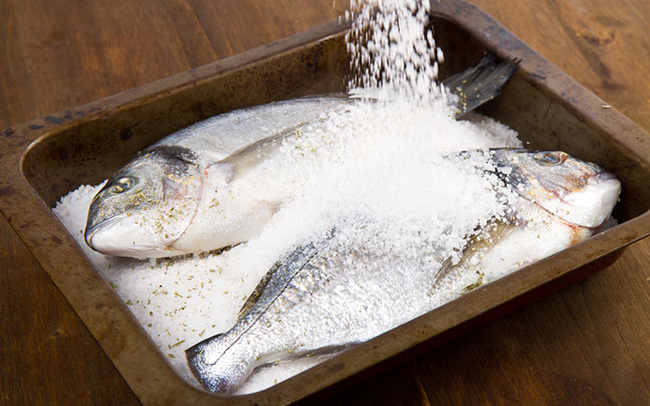Seafood such as fish is a favorite choice for many families, especially during social distancing. Preparing delicious and nutritious fish dishes for family members is a great way to show your love and care.
However, if fish is not stored properly, it can quickly spoil, developing an unpleasant odor and texture. Knowing how to store fresh fish at home will give homemakers more options when it comes to keeping their seafood fresh.
Choose fresh fish when purchasing
To ensure longer freshness and delay spoilage, it’s important to select fresh fish right from the start. Freshly caught fish will have a slower bacterial growth rate, which in turn extends its shelf life.

Choose fresh fish – Photo via Internet
Ways to store fresh fish at home
In reality, there are several methods that homemakers can use to keep their fish fresh at home, such as storing it in the refrigerator, or using lemon or vinegar…
Guide to storing fish in the refrigerator
Storing fish in the refrigerator is a popular choice for many homemakers. Here’s how it’s done:
– After purchasing the fish, clean it thoroughly.
– Pay special attention to cleaning the gut and belly of the fish.
– Place the cleaned fish in an airtight container (you can also wrap it securely) and then store it in the freezer compartment of your refrigerator.
It’s important to note that when storing fish, it’s best to portion it into sizes that can be consumed in one meal. Thaw only the amount you need each time, rather than repeatedly freezing and thawing the fish, as this will result in a loss of nutrients.

Fish stored in the refrigerator – Photo via Internet
Storing fish with lemon or vinegar
Although not as popular as storing fish in the refrigerator, using lemon or vinegar is another method trusted by many homemakers. Here’s how it’s done:
– After purchasing fresh fish, apply lemon juice or a small amount of vinegar to the fish.
– Be sure to apply the lemon juice or vinegar inside the belly of the fish as well. This helps to neutralize the fishy odor and also delays spoilage.
– However, with this storage method, the shelf life of the fish is relatively short. Fish stored with lemon or vinegar will only stay fresh for about 3 to 5 hours.
White wine as a preservative
White wine can be used as a simple preservative for fish. Just pour a small amount of white wine into the mouth of the fish. This method can keep fish fresh for 1 to 3 days, depending on the environment and weather conditions.
Storing fish with salt

Salt-cured fish – Photo via Internet
Salt-cured fish
One popular method of salt-curing fish is as follows:
– After cleaning the fish, rub it thoroughly with salt, both inside and out.
– Allow the fish to absorb the salt. The time needed for this step will depend on the size of the fish.
– Then, store the fish in the refrigerator. It can be kept in the cool compartment for up to a week without spoilage.
Brining the fish
Brining involves soaking the fish in a saltwater solution. Dissolve salt in water, then submerge the fish in the brine. The ratio of fish to brine should be 1:1 or 1:1:5 (for every liter of water, use 55-56 grams of salt). Make sure the brine completely covers the fish.
Leave the fish in the brine for 10 to 12 hours. After about 6 hours, the fish should have absorbed enough salt. Then, transfer it to an airtight container and seal it for storage.
Before cooking the fish, remove it from the brine about an hour beforehand to allow it to thaw. You can enhance the flavor of the fish by squeezing lemon or vinegar over it.
With these tips, homemakers can confidently store fresh fish at home, ensuring safe and delicious meals for their families.
According to Phap Luat va Ban Doc (Law and Readers)
The Magic of a Balloon: Eliminating Stinky Drains with a Simple Household Hack
The bathroom can be a haven of relaxation, but a malodorous drain can quickly ruin the ambiance. This is a common issue faced by many, and it can be a challenge to eradicate those unpleasant odors. The good news is that there are effective solutions to this stinky problem. So, how can you ensure your bathroom drain stays fresh and odor-free?





































